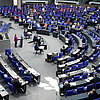National Prevention Initiative (NPI)
© Copyright: BMG
Logo der Nationalen Präventions-Initiative
“In Zukunft gesünder” (Healthier in Future) – this is the motto under which the Federal Ministry of Health launches its National Prevention Initiative. The goal of this Initiative is to place a focus on health promotion and disease prevention by combining efforts with the Länder, the agencies of the National Prevention Conference as well as experts in the field, research, civil society and politics. Prevention and health promotion can only be implemented successfully through joint activities by the leading partners at the Federal, Länder and municipal levels.
With the National Prevention Initiative, the Federal Ministry of Health initiates a dialogue and networking process and offers stakeholders a forum for exchange as well as joint advancement of key levers and future topics in order to strengthen prevention.
Why have a National Prevention Initiative?
The ageing population, labour shortages, the growing significance of chronic, lifestyle-related illnesses as well as climate change confront our society and the healthcare system with great challenges. At the same time, scientific insights gained in public health research highlight the potential of early and continued application of measures for health promotion and prevention.
In health promotion and prevention, there are structures with a large number of state and non-state actors at the various political levels. Not least based on the Act to Strengthen Health Promotion and Prevention of 2015, structures were established at Federal and Land level and, with support from the social security institutions in particular, numerous activities were initiated. The efforts of all the stakeholders still need to be better coordinated, however, so as to leverage potential and add value. This is because the requirements and good prospects for health are not only affected by the healthcare system, but also by the individuals’ lifestyle, living and working conditions as well as other factors in their socio-economic, cultural and physical environment.
Strengthening prevention and health promotion allows for
- a higher life expectancy and more years in good health, which leads to a healthier population overall,
- better quality of life for all people, less personal suffering due to illness,
- health equity in all aspects of life,
- long-term easing of the burden on the healthcare system
- retention of employability, thereby contributing toward securing the supply of skilled workers in and outside of the healthcare system.
Promoting health-centred policymaking
The National Prevention Initiative (NPI) ties onto existing activities and structures and offers a platform to develop these further and to identify pioneering, innovative ideas. It is characterised particularly by a non-disease specific approach that identifies and advances levers important for the work of all stakeholders. In addition to the essential basics for prevention and health promotion, such as ensuring the availability of relevant data and improving the evidence on usage and effectiveness of particular measures, these levers also include promoting health literacy both among the population and the institutions and developing concepts to implement the promotion of a Health in All Policies approach. At the same time, the National Prevention Initiative provides a space for developments such as digitalisation and new challenges such as climate change.
The National Prevention Initiative is one component of an entire package of measures by the Federal Ministry of Health to improve prevention and public health in treatment and care.
Results of the NPI
Initial results are available from projects that have already been carried out, above all in the context of workshops and expert opinions addressing individual action fields on prevention or projects that attend in detail to topics that serve as important levers in all prevention areas.
Expert opinions
You can find details on these projects in the publication area:
-
Expert discussions on preventing need for long-term non-residential care
How can the need for long-term care be prevented, delayed or even reversed using approaches that promote health and prevent disease? On behalf of the Federal Ministry of Health, the IGES Institute held three expert discussions in October 2024 with representatives from the field, research and politics. Drawing on content from the expert discussions, the IGES Institute compiled a framework concept on long-term care prevention, which describes and categorises the tasks that are to be carried out for a systematic prevention of the need for long-term care and also indicates which stakeholders should first and foremost be responsible for these. Furthermore, conclusions were drawn and recommendations derived.
Find out more -
Reaching and addressing vulnerable groups regarding heat protection
Heat is one of the greatest climate change-induced health risks in Germany, particularly among vulnerable groups of people. In 2024, an expert opinion and a communication concept on heat protection were created for these risk groups. The present project focuses on implementing these concepts as well as developing guidelines for people with disabilities.
Find out more - Prevention of the need for long-term non-residential care
By 2021, the number of long-term care patients in Germany had risen to around 5 million people and will grow to 6.8 million by 2055. The expert opinion identifies and evaluates the literature on preventive approaches before a need for long-term care emerges and/or in non-residential care. It analysed 29 findings on preventing the need for long-term non-residential care with an emphasis on international studies and those more representative of the German perspective.
Find out more
































